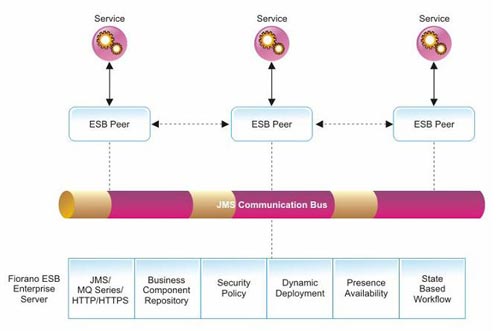The Fiorano ESB implements a brokered, peer-to-peer (often referred to as super peer) system architecture, which combines the management benefits of centralized hub-and-spoke systems with the performance benefits of fully distributed peer-to-peer systems, while avoiding the particular disadvantages of both of these individual approaches. The figure illustrates the Fiorano ESB brokered peer-to-peer architecture.

- Enterprise Class Backbone: Underlying the ESB architecture is an enterprise-class, standards-based messaging backbone which provides secure and reliable communications between any number of applications and distributed integration processes across the enterprise. Using Fioranos unique distributed peer-to-peer JMS implementation, the backbone allows distributed integration processes and composite applications to scale to meet the requirements of the most demanding global enterprise networks.
- Efficiency: ESB peers at the end-points of the network allow distributed microservices to exchange events concurrently, enabling all of the parallelism in an integration process to be exploited. For instance, an order management system in a manufacturing plant can check its inventory status even as the sales-force management system is updating the order database. Data transformations and other computations required by distributed integration processes are performed concurrently at the end-points of the network.
- Unbounded Scalability: With dispersed computation and parallel message-flow between nodes, ESB peers scale naturally and seamlessly with the addition of new peer nodes and Enterprise microservices across the network.
- Ease of Administration: In a Fiorano ESB network, operations such as event-handling, security authentication and administration are performed by centralized servers. ESB peers at the end-points of the network are easily administered via tools connected to the centralized ESB Enterprise Server.
Fiorano's brokered peer-to-peer architectural approach thus combines the benefits of both peer-to-peer systems and hub-and-spoke systems in a single cohesive architecture for a scalable enterprise backbone.

 Japan
Japan Germany
Germany
